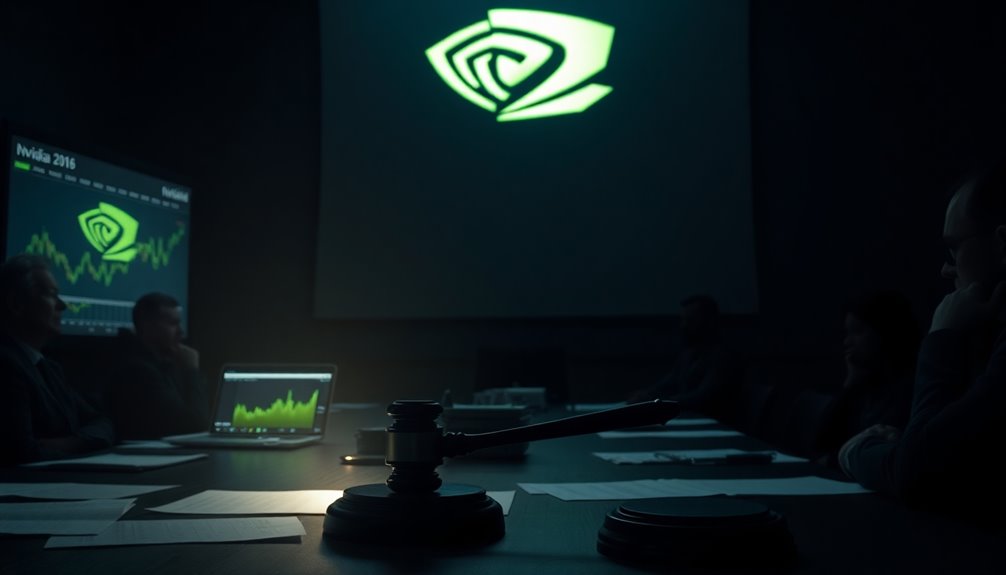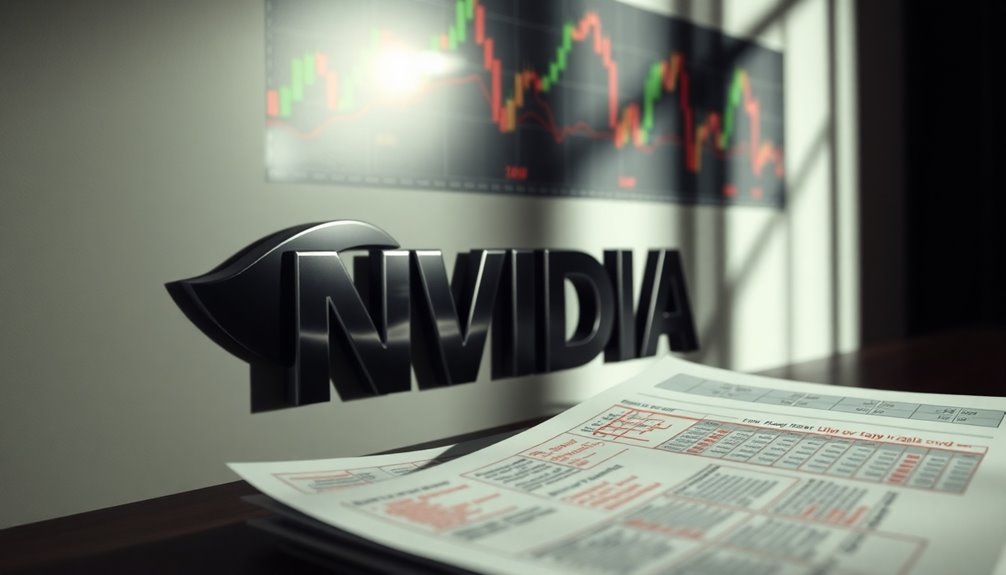Nvidia's been hit with a major shareholder lawsuit for allegedly concealing significant crypto revenue. This lawsuit, which has roots going back to 2018, claims Nvidia misled investors about its reliance on cryptocurrency sales and the impact those had on its financial growth. The Supreme Court has allowed the case to proceed, signaling serious concerns. If the plaintiffs succeed, Nvidia could face hefty financial penalties. This situation not only jeopardizes Nvidia's market confidence but also highlights the industry's need for greater transparency. There's a lot more to uncover about the implications of this case and Nvidia's future commitments.
Key Takeaways
- Nvidia faces a class-action lawsuit for allegedly concealing cryptocurrency revenue and misleading investors about its impact on financial growth.
- The Supreme Court's dismissal of Nvidia's appeal allows the lawsuit to proceed, highlighting serious allegations against the company.
- Plaintiffs claim Nvidia downplayed its reliance on volatile crypto sales, supported by evidence and former employee testimonies.
- If successful, the lawsuit could result in significant financial damages for Nvidia, impacting investor confidence and market reputation.
- The case emphasizes the importance of transparency in financial reporting for tech companies, particularly in emerging industries like cryptocurrency.
Supreme Court Ruling Overview

The recent Supreme Court ruling brings clarity to Nvidia's ongoing legal battle, as it dismissed the company's appeal and allowed a 2018 class-action lawsuit to proceed. This decision followed the justices hearing arguments just four weeks earlier. They recognized they were mistaken to take up the case initially and ultimately left the appellate ruling intact, which had previously revived the fraud charges against Nvidia.
In 2021, a district court judge had dismissed the complaint, but the 9th US Circuit Court of Appeals overturned that decision, allowing the case to move forward. The Supreme Court's ruling focused strictly on procedural issues, without addressing the underlying legal dispute. This means Nvidia must now confront the class-action lawsuit head-on.
The lawsuit involves allegations under the Securities Exchange Act of 1934, with Nvidia arguing that the claims didn't meet the standards set by the Private Securities Litigation Reform Act of 1995. The Biden administration even backed the investors during the Supreme Court proceedings. Despite these legal hurdles, Nvidia's stock has surged by 180% this year, showcasing the company's resilience amid ongoing scrutiny and investigations. Additionally, the class-action lawsuit highlights broader concerns about investor confidence in the tech industry.
Allegations Against Nvidia

Misleading investors about its revenue sources has put Nvidia in hot water, with allegations surfacing that the company downplayed the impact of volatile cryptocurrency-mining sales on its financial growth. Shareholders claim Nvidia failed to disclose that a significant portion of its revenue growth during 2017 and 2018 stemmed from these unpredictable crypto sales. This lack of transparency left you and other investors blindsided when the crypto market crashed, leading to substantial financial losses.
Additionally, the lawsuit accuses Nvidia of violating the Securities Exchange Act of 1934 by allegedly falsifying financial information and deceiving both investors and analysts. By not adequately indicating the volatile nature of its crypto-mining revenue, Nvidia misled you about its true financial health, distorting market perceptions. The consequences were severe, as the company's stock price fell sharply post-crash, eroding investor confidence. The dismissal of appeals in similar cases reinforces the importance of shareholder rights and the necessity for accurate disclosures regarding financial performance.
These allegations suggest that Nvidia's actions didn't just harm individual shareholders but also undermined trust in the broader securities markets. The case underscores the critical need for corporate accountability and transparency in financial reporting, which are essential for accurate market assessments and informed investor decisions.
Legal Background of the Case

Nvidia's legal journey in this shareholder lawsuit has been tumultuous, marked by significant court rulings and appeals. The initial lawsuit was filed in 2018 by shareholders, led by E. Ohman J:or Fonder AB, claiming that Nvidia concealed crypto revenue. Initially, a federal district court dismissed the case, stating the shareholders didn't meet the heightened legal standards set by the Private Securities Litigation Reform Act (PSLRA). However, this decision was reversed by the 9th U.S. Circuit Court of Appeals, which found that the plaintiffs had adequately alleged that Nvidia made false statements knowingly or recklessly.
Nvidia then appealed to the U.S. Supreme Court, arguing that the plaintiffs failed to prove their case met the required legal standards. In a swift turn, the Supreme Court dismissed Nvidia's appeal without elaboration, allowing the case to proceed in lower courts. This legal backdrop highlights the complexities surrounding securities fraud claims, particularly the PSLRA's stringent requirements for pleading falsity and intent. As the case moves forward, it underscores ongoing debates about legal standards and the implications for corporate disclosures in the tech industry. Nvidia's appeal dismissal leaves the company to face the lawsuit in lower courts, further complicating its legal challenges.
Financial Consequences for Nvidia

Facing the fallout from the shareholder lawsuit, Nvidia could see significant financial repercussions if the plaintiffs prevail. They're seeking unspecified monetary damages for losses linked to Nvidia's alleged misstatements, which could greatly impact the company's finances. If the lawsuit succeeds, damages may reflect the drop in Nvidia's stock price after the 2018 crypto market collapse, when investors watched the stock plummet 28% in just two days.
Moreover, Nvidia already faced scrutiny over its crypto revenue disclosures when it paid $5.5 million to settle SEC claims in 2022. This regulatory fine underscores the potential for more penalties if Nvidia's compliance continues to falter. While Nvidia's stock has surged nearly 190% this year, it's crucial to consider how ongoing legal challenges might affect market confidence. Additionally, the outcome of the lawsuit could set important precedents for corporate accountability, which may influence how companies communicate with investors in the future.
In the long run, Nvidia is diversifying its focus to reduce reliance on volatile sectors like crypto mining, but the lawsuit serves as a stark reminder. It emphasizes the need for accuracy in public statements, especially in fluctuating markets, as future legal outcomes could set precedents that impact their operations and financial health.
Evidence Presented by Plaintiffs

The evidence presented by the plaintiffs in the Nvidia shareholder lawsuit paints a troubling picture of alleged misrepresentation. Nvidia and CEO Jensen Huang stand accused of violating the Securities Exchange Act of 1934 by downplaying the company's reliance on crypto-related sales during 2017 and 2018. The plaintiffs claim that Huang knowingly or recklessly made false or misleading statements about the impact of cryptomining on Nvidia's business, despite substantial revenue growth attributed to these sales.
Former employees support the allegations, providing insights that underscore Nvidia's concealed dependency on cryptocurrency. Market analysis highlights a surge in chip sales linked to crypto mining during that period, contrasting sharply with Nvidia's financial disclosures. Additionally, the rising importance of digital asset management in the crypto space during this time likely contributed to the heightened demand for Nvidia's products. Comparing financial reports before and after the crypto market crash reveals significant discrepancies, reinforcing the plaintiffs' claims. Additionally, Nvidia's stock dropped over 28% post-2018 crypto crash, indicating the severity of the financial impact on investors.
Legal proceedings have seen the lawsuit revived by the 9th U.S. Circuit Court of Appeals after an initial dismissal, with the Supreme Court opting not to intervene. The lower court ruled that the plaintiffs had sufficiently alleged false statements, allowing the case to move forward. Regulatory bodies, including the SEC and the Department of Justice, bolster the shareholders' claims, calling for greater financial transparency in emerging industries.
Broader Implications for Tech Industry

With increasing scrutiny on financial disclosures, the Nvidia shareholder lawsuit underscores significant implications for the tech industry at large. This case highlights the critical need for transparency, especially for companies involved in crypto activities. The SEC's emphasis on detailed disclosures means that firms can face serious legal and financial repercussions for non-compliance. You'll need to recognize that maintaining investor trust hinges on clear communication about revenue sources and associated risks.
Moreover, Nvidia's missteps serve as a warning about market volatility linked to inadequate disclosures. The dramatic stock drop in 2018 illustrates how misattributed revenue can shake investor confidence. To mitigate such risks, tech companies must adopt stricter transparency standards and articulate potential market fluctuations clearly. Notably, Nvidia faced a $5.5 million fine from the SEC for failing to disclose its reliance on crypto revenue.
This situation also stresses the importance of robust risk management and diversification strategies. Companies must prepare for shifts in demand and adapt quickly to maintain competitiveness. As the tech sector evolves, adhering to these principles will not only help you avoid similar legal troubles but also contribute to greater industry stability and investor confidence. In essence, the Nvidia lawsuit could reshape how tech firms approach financial disclosures in the future.
Government Involvement and Support

Highlighting the active role of government agencies, the Nvidia shareholder lawsuit showcases a concerted effort by the SEC and the DOJ to hold the tech giant accountable for alleged misrepresentations. Both agencies supported the class-action lawsuit, emphasizing that Nvidia misled investors regarding the impact of crypto mining on its revenue. They pointed to public statements made by CEO Jensen Huang that downplayed the significance of crypto in Nvidia's commercial success.
The Supreme Court's dismissal of Nvidia's appeal allowed the case to proceed, while the Ninth Circuit Court of Appeals reinstated the lawsuit after an earlier dismissal. The DOJ and SEC even submitted an amicus brief to bolster the investors' claims, requesting oral arguments for the forthcoming court hearings. The company's previous settlement with the SEC for $5.5 million in 2022 over similar nondisclosure issues further highlights the seriousness of the allegations.
With the Ninth Circuit finding that Huang acted with intent to mislead, the case underscores the government's commitment to enforcing transparency and accountability in corporate reporting—especially in rapidly evolving sectors like cryptocurrency. This involvement signals a clear warning to other tech companies about the importance of accurate disclosures.
Future of Nvidia's Financial Reporting

Nvidia faces a pivotal moment in its financial reporting practices as it grapples with the implications of the ongoing shareholder lawsuit. The Supreme Court's decision to allow the lawsuit to proceed underscores the pressing need for clearer financial transparency, particularly regarding cryptocurrency revenue. With allegations of underreporting $1.35 billion, Nvidia must enhance its disclosure practices to avoid misleading investors about its reliance on crypto sales.
You can expect Nvidia's financial reports to undergo increased scrutiny, especially in emerging technology segments. It's crucial that all material information gets recorded, processed, and reported within specified timelines. Adhering to Generally Accepted Accounting Principles (GAAP) is essential for maintaining accurate financial statements. This scrutiny comes at a time when Nvidia has reported a record Data Center revenue of $30.8 billion, which could further complicate its financial narrative.
The outcome of this case could set a precedent for stricter regulatory guidelines, impacting how Nvidia and similar companies report earnings from volatile industries. To mitigate future legal risks, you should anticipate the implementation of enhanced internal audit and compliance measures.
Ultimately, transparent financial reporting will be vital for maintaining investor trust and market confidence. As Nvidia navigates this challenging landscape, its commitment to accurate reporting will play a significant role in shaping its financial future.
Frequently Asked Questions
What Are the Potential Outcomes of the Lawsuit for Nvidia?
If the lawsuit succeeds, you might see significant financial repercussions for Nvidia, including potential monetary damages from investors. This could lead to a decrease in stock price and affect investor confidence. Alternatively, if Nvidia settles, it could face hefty costs similar to previous settlements. You'll also notice increased scrutiny on corporate practices, possibly prompting changes in Nvidia's reporting and operational strategies to restore trust and transparency among stakeholders.
How Might This Lawsuit Affect Nvidia's Stock Price in the Future?
This lawsuit could create significant volatility in Nvidia's stock price. If investors grow cautious about the potential legal repercussions, you might see a short-term drop. However, if Nvidia's overall financial health remains strong, the market's reaction could be muted. Long-term, any financial penalties or transparency issues could erode your confidence, but a favorable outcome might stabilize or even boost the stock. Keep an eye on how the situation develops to gauge future impacts.
What Defenses Could Nvidia Use Against the Allegations?
You could argue that Nvidia's defenses against the allegations center on their commitment to transparency and compliance with securities laws. They might emphasize that their statements were made in good faith, reflecting available data. If you consider the unpredictable nature of the cryptocurrency market, Nvidia could claim that any perceived misrepresentation wasn't intentional. Additionally, they may highlight that lower courts are better equipped to assess the complexities of the case, rather than the Supreme Court.
How Have Other Tech Companies Responded to Similar Lawsuits?
When facing similar lawsuits, other tech companies often enhance transparency and strengthen compliance measures. They might invest in robust legal teams to navigate complex regulations and proactively address shareholder concerns. Some firms, like Meta, have opted for settlements, while others focus on improving their public relations strategies to rebuild trust with investors. Ultimately, companies like yours need to adapt quickly to maintain credibility and mitigate the impact of legal challenges on stock performance.
What Are the Long-Term Effects of This Case on Shareholder Rights?
The long-term effects of this case on shareholder rights could be significant. You might see stronger legal precedents emerging, empowering shareholders to hold companies accountable for misleading information. Increased transparency requirements could lead firms to disclose revenue sources more accurately. As a result, you can expect more class-action suits, enhancing your protection as an investor. Overall, these changes could foster a more trustworthy market environment, boosting your confidence in company disclosures.
Conclusion
In light of the shareholder lawsuit against Nvidia, it’s clear that transparency in financial reporting is crucial. The allegations of concealed crypto revenue not only threaten Nvidia’s reputation but also set a precedent for accountability in the tech industry. As the legal battle unfolds, you’ll want to keep an eye on its financial implications and the potential changes in regulatory practices. Ultimately, the outcome could reshape how tech companies communicate their earnings to investors moving forward. It’s important for investors and stakeholders to stay informed about this lawsuit and the potential impact it may have on Nvidia’s financial standing. Additionally, in the wake of this controversy, regulatory bodies such as the UK FCA proposes ban on crypto-related financial products, which would further impact how tech companies disclose their cryptocurrency revenues in the future. This case serves as a reminder of the importance of transparency and accurate financial reporting in maintaining trust and credibility in the tech industry. Moreover, as the situation develops, analysts will be closely examining the implications for the broader crypto compliance landscape insights, which could lead to stricter regulations governing cryptocurrency transactions in the tech sector. Companies may need to adapt their reporting practices to ensure compliance with evolving standards, safeguarding both investor interests and their organizational integrity. The Nvidia lawsuit thus not only affects the company’s future but also has the potential to influence how the entire tech industry approaches transparency and accountability in financial disclosures related to cryptocurrencies.









